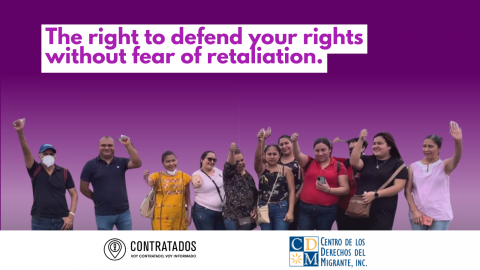Octubre 28, 2024
As a worker in the United States, you have the right to defend your labor rights without fear of retaliation.

All migrant workers have labor rights and human rights, and the right to defend each of them; however, it is difficult to recognize when our rights are violated, and even more so if we face retaliation in response. Here we tell you about what the right to defend your rights means.
Retaliation is action that an employer takes against a worker for asking for better working conditions or defending their rights. These actions can include: firing, assigning the worker to a lesser position, providing fewer hours of work or rest, less pay, and not hiring the worker again, among other adverse actions. These actions are known as retaliation and they are illegal. Some examples of retaliation are:
Maria and Juana, H-2B workers, notice that their supervisor is cutting hours from their checks. Although they start work every day at 6:40am, their supervisor registers their start time as 7:00am. Together, they confront the supervisor to ask that she registers their hours correctly. The next week, she advises them that they are only going to work 3 days that week, when they normally work 6 days. No other worker is required to rest, and there is not a work shortage. This could be classified as retaliation.
Arturo, an H-2A worker, notices that his employer divides the crews based on if the workers speak indigenous languages or Spanish, and he gives the more difficult work to the crews in which the majority of workers speak indigenous languages. During a break, Arturo calls the EEOC to file a complaint and the supervisor hears it; he becomes angry and says that if Arturo doesn’t like it, he should return to Mexico. The next day, Arturo is fired for “lack of performance,” although he always maintains the same pace of work as the other workers. This could be classified as retaliation against Arturo.
Unfortunately, retaliation isn’t always so apparent or clear, and for that reason, it’s important to write everything down and pay special attention to possible actions of your employer after asking for improvements related to work. Additionally, it’s important that you organize with your coworkers to ask for improvements together, because for many workers, there are protections that could cover people who organize together to achieve a goal or defend their labor rights.
It is important to note that since 2023, there is a possibility of migration relief, known as Deferred Action, that can protect people who complain about abusive employers and reduce the risk of retaliation. Learn more about deferred action here.
If you relate to one of these situations, or if you have questions about retaliation or another work-related issue, do not wait; the timeframes are very important and short. Write everything down and seek legal help as soon as possible. We invite you to contact our team via SOL, or calling between Monday and Friday from 9am to 5pm, from Mexico at 800 5901773, from the United States at 1 855 234 9699 or from other places at 55 52 11 9397.
Our services are completely free and confidential.
We are on Youtube and Facebook, visit us and join the fight.
